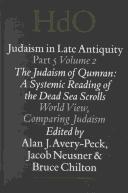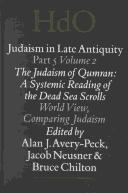| Listing 1 - 4 of 4 |
Sort by
|

ISBN: 9789004294196 9789004120037 9789004120013 9004120017 9004120033 Year: 2001 Publisher: Leiden: Brill,
Abstract | Keywords | Export | Availability | Bookmark
 Loading...
Loading...Choose an application
- Reference Manager
- EndNote
- RefWorks (Direct export to RefWorks)
Book
ISBN: 0334025788 9780334025788 Year: 1994 Publisher: London SCM
Abstract | Keywords | Export | Availability | Bookmark
 Loading...
Loading...Choose an application
- Reference Manager
- EndNote
- RefWorks (Direct export to RefWorks)
Jews --- Judaism --- Juifs --- Judaïsme --- History --- Historiography --- Sources --- Historiography. --- Histoire --- Historiographie --- 933 --- Geschiedenis van Palestina en het Joodse volk --- 933 Geschiedenis van Palestina en het Joodse volk --- Judaïsme --- Jews - History - 168 B.C.-135 A.D. - Historiography --- Jews - History - 168 B.C.-135 A.D. - Sources --- Jews - History - 586 B.C.-70 A.D. - Historiography. --- Jews - History - 586 B.C.-70 A.D. - Sources --- Judaism - History - Post-exilic period, 586 B.C.-210 A.D. - Historiography. --- Judaism - History - Post-exilic period, 586 B.C.-210 A.D. - Sources --- Sources.
Book
ISBN: 9789004295834 9789004100602 9004100601 9004295836 Year: 1994 Volume: 122 Publisher: Leiden Brill
Abstract | Keywords | Export | Availability | Bookmark
 Loading...
Loading...Choose an application
- Reference Manager
- EndNote
- RefWorks (Direct export to RefWorks)
Sabbath worship as a communal event does not feature in the Hebrew Bible. In the context of the first century CE, according to Philo and Josephus, the sabbath gatherings took place only for the purpose of studying the law, and not for the liturgical recital of psalms or prayer. Classical authors depict Jews spending the sabbath at home. Jewish inscriptions provide no evidence of sabbath-worship in prayer-houses ( proseuchai ), while the Mishnah prescribes no special communal sabbath activities. The usual picture of Jews going on the sabbath to the synagogue to worship thus appears to be without foundation. It is even doubtful that there were synagogue buildings, for 'synagogue' normally meant 'community'. The conclusion of this study, that there is no evidence that the sabbath was a day of communal Jewish worship before 200 CE, has far-reaching consequences for our understanding of early Jewish-Christian relationships. This publication has also been published in paperback, please click here for details.
Sabbath - Biblical teaching. --- Sabbath in rabbinical literature. --- Judaism - History - Post-exilic period, 586 B.C.-210 A.D. - Sources. --- Sabbath --- Biblical teaching --- Judaism --- History --- Post-exilic period, 586 B.C.-210 A.D. --- Sources --- Jews --- Religions --- Semites --- Sabbath in the Midrash --- Rabbinical literature --- Lord's Day --- Shabbat --- Rest --- Sunday --- Bible teaching. --- Religion --- Religious aspects --- Christianity --- Sabbath in rabbinical literature --- 296.4109015 --- 296*514 --- 296*514 Sabbat en feestdagen --- Sabbat en feestdagen --- Religion Judaism Sabbath 1st-5th centuries, 1-499 --- Sabbat --- Sabbat dans la littérature rabbinique --- Enseignement biblique --- Sources.

ISSN: 01699423 ISBN: 9004101306 9004101292 9004111867 9004112626 9004120017 9004112820 9004118926 9004120009 9004120033 9004293965 9004293981 9004294147 9004294163 9004294171 900429418X 9004294198 9004294058 9789004101302 9789004111868 9789004112629 9789004293960 9789004294059 9789004101296 Year: 1999 Volume: 16-17, 40-41, 49, 53, 55-57 Publisher: Leiden Brill
Abstract | Keywords | Export | Availability | Bookmark
 Loading...
Loading...Choose an application
- Reference Manager
- EndNote
- RefWorks (Direct export to RefWorks)
This collection of systematic Auseinandersetzungen articulates difference and spells out what is at issue. Learning atrophies when political consensus substitutes for criticism, and when other than broadly-accepted viewpoints, approaches, and readings find a hearing only with difficulty, if at all. The editors therefore have invited colleagues systematically to outline their views in an Auseinandersetzung with contrary ones. The several participants explain how, in broad and sweeping terms, they see the state of learning in their areas of special interest. The editors invited leading players in the USA, Europe, and the State of Israel, in the study of ancient Judaism, both in Second Temple Times and after 70 C.E. The work commences with a thoroughly fresh perspective of a theoretical question: what, in a religion so concerned with social norms and public policy, can we possibly mean by 'law' when we speak of law in Judaism. It then proceeds with two chapters on Second Temple Judaism, and two on the special subject of the Dead Sea library. The two papers in the present part provide an overview of matters and a systematic, critical account of the fading consensus, respectively. The next set of papers ought to stand as the definitive account of the diverse viewpoints on a basic question of method. Because of the willingness of contending parties to meet one another in a single frame of discourse, the work is able to portray with considerable breadth the presently-contending viewpoints concerning the use of Rabbinic literature for historical purposes. Then proceed a number of other accounts of how matters look from the perspective of major participants in scholarly debate. At the same time as the requirements of historical-critical reading of the Rabbinic literature precipitated sustained and vigorous debate, other problems have attracted attention. Among these a critical issue emerges in the hermeneutics to govern the reading of the documents for the purposes of other-than-historical study, feminist interests, for example.
Judaism --- History --- Sources --- -296.09015 --- Geschiedenis van het Joodse volk: Romeinse tijd I Masadah vernieling van deTempel--(63 v.Chr.-70 n.Chr.) --- Religion Judaism History (1-499) --- 933.52 --- Geschiedenis van het Joodse volk: Byzantijnse tijd--(325-638) --- -Religion Judaism History (1-499) --- 933.33 Geschiedenis van het Joodse volk: Romeinse tijd I Masadah vernieling van deTempel--(63 v.Chr.-70 n.Chr.) --- 933.52 Geschiedenis van het Joodse volk: Byzantijnse tijd--(325-638) --- 296.09015 --- 296*33 --- Hellenistisch-joodse literatuur--(algemeen) --- 296*33 Hellenistisch-joodse literatuur--(algemeen) --- 933.3 --- 933.3 Geschiedenis van het Joodse volk: Tweede Tempelperiode--(538 v.Chr.-70 n.Chr.) --- Geschiedenis van het Joodse volk: Tweede Tempelperiode--(538 v.Chr.-70 n.Chr.) --- Jews --- Religions --- Semites --- Religion --- 933.32 --- 933.33 --- 933.33 Geschiedenis van het Joodse volk: Romeinse tijd I; Masadah; vernieling van deTempel--(63 v.Chr.-70 n.Chr.) --- Geschiedenis van het Joodse volk: Romeinse tijd I; Masadah; vernieling van deTempel--(63 v.Chr.-70 n.Chr.) --- 933.32 Geschiedenis van het Joodse volk: hellenistische tijd--(332-63 v.Chr.) --- Geschiedenis van het Joodse volk: hellenistische tijd--(332-63 v.Chr.) --- -Congresses --- 229*319 --- 229*319 Qumran en het jodendom --- Qumran en het jodendom --- Sources. --- Judaïsme --- Histoire --- Hellenistic Judaism --- Judaism, Hellenistic --- Post-exilic period (Judaism) --- 586 B.C. - 210 A.D. --- Post-exilic Period (Judaism) --- Judaism - History - Post-exilic period, 586 B.C.-210 A.D. - Sources. --- Judaism - History - Post-exilic period, 586 B.C.-210 A.D. - Sources --- -History --- -Judaism --- Judaïsme --- Manuscrits de la Mer Morte --- Qumrān (Cisjordanie ; site archéologique) --- 586 av. J.-C.-210 (Période postexilique) --- Critique, interprétation, etc., juives
| Listing 1 - 4 of 4 |
Sort by
|

 Search
Search Feedback
Feedback About UniCat
About UniCat  Help
Help News
News